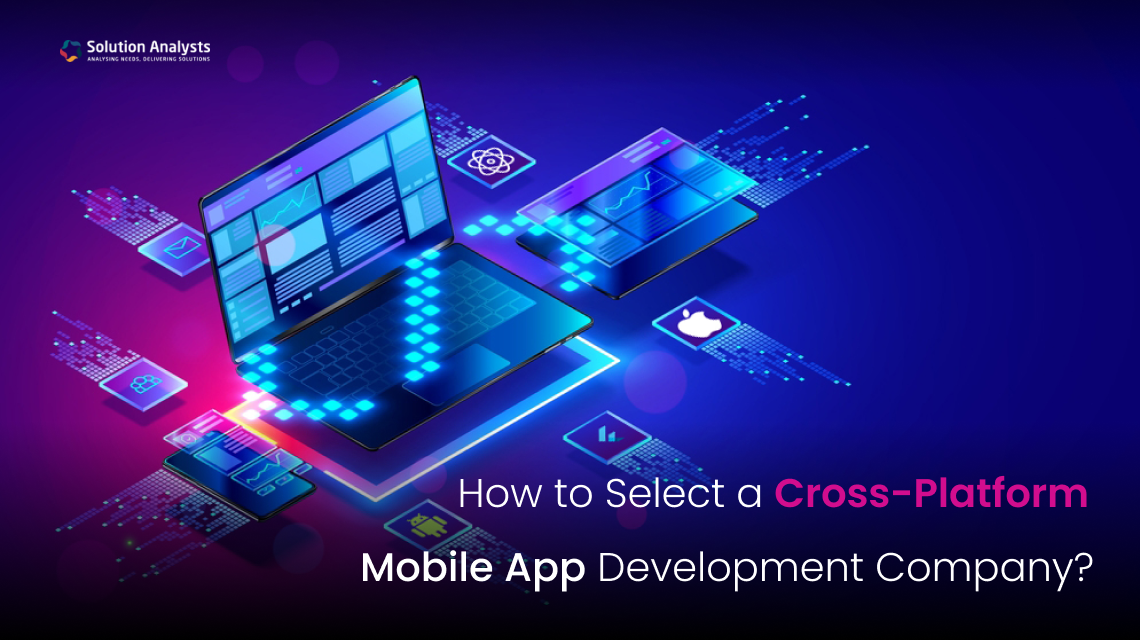
Table of Contents
Businesses in today’s lightning-fast digital world need to find ways to reduce development costs and increase reach across all mobile devices. The ideal answer is to use cross-platform mobile app development, which lets you build an app once and have it run flawlessly on all major mobile platforms. The success of your app, though, hinges on your choice of cross-platform mobile app development business. This article will walk you through the steps of finding the ideal development partner, as well as the benefits, process overview, cost considerations, and critical criteria to keep in mind while making your selection.
1. Why Developing Mobile Apps for Multiple Platforms Is Beneficial
The many benefits that cross-platform mobile app development provides to companies have contributed to its meteoric rise in popularity:
- Cutting costs:
Instead of hiring two teams to create native apps for iOS and Android, you can save a ton of money by using a single codebase for both platforms.
- Accelerated Progress:
One way to reduce development time and increase time-to-market is to create an app that can run on more than one platform.
- Expanded Customer Base:
With a cross-platform software, you can reach more people and grow your user base by catering to both the iOS and Android markets.
- Simplified Upkeep:
It is more easier and cheaper to manage and update a single codebase rather than maintaining many codebases for different platforms.
- Efficient and Reliable User Interface:
With the help of cross-platform frameworks, programmers can make sure that their apps seem the same on all of their consumers’ devices.
2. The Cross-Platform Development Process: An Overview
The following steps are usually involved in developing a mobile app that works on many platforms:
- Collecting Needs:
This necessitates familiarity with the app’s function, intended users, and fundamental capabilities. Any precise specifications concerning platform compatibility and performance must be detailed.
- Choosing a Structure:
Flutter, React Native, and Xamarin are just a few of the well-known frameworks for building apps that run on several platforms. Consider the technical needs, performance expectations, and future scalability of your project when choosing a framework.
- Creating the Application:
A cross-platform user interface that is compatible with both Android and iOS is the primary goal of the design phase. Designers can keep their work consistent across all devices with the help of cross-platform technologies.
- Advancement:
Builders can use the chosen framework to construct the app from a single source. They check that the app works properly with the device’s built-in features including the camera, GPS, and alerts.
- Concerning testing and quality assurance:
If you want your cross-platform software to work properly on both iOS and Android, you need to test it on a wide range of devices with different screen sizes.
- Managing the Rollout and Upkeep:
Both the Google Play Store and the Apple software Store get the software after testing. As part of routine maintenance, there are frequent updates that address bugs and provide new features.
3. Analyzing Expenses
Several factors can affect how much it will cost to design a mobile app that works across multiple platforms:
- App Difficulty:
Complex apps with advanced characteristics, such as real-time chat, payment gateways, or AR/VR capabilities, tend to cost more than simple apps with basic features.
- Framework Selection:
Development framework choice might affect budgets. Examples of popular and well-supported frameworks that can help keep development expenses down are Flutter and React Native.
- Knowledge of Development:
Costs may be affected by hiring seasoned engineers who are skilled in working with frameworks that span many platforms. Professional developers may be more expensive, but they usually produce more efficient and high-quality work.
- The expense of upkeep:
Maintaining individual native apps is typically more work than keeping a cross-platform app up to date. Nevertheless, it is crucial to allocate funds for upgrades, bug patches, and changes in operating system compatibility.
Depending on the app’s complexity and the size of the development team, the typical prices for cross-platform app development might vary from $15,000 to $100,000.
4. Finding the Best Partner for Cross-Platform Development

For your cross-platform software to be a success, you must choose a reliable development partner. Important considerations include:
– Proficiency in Frameworks that Bridge Platforms
Make sure they have worked with recent cross-platform frameworks such as Xamarin, Flutter, or React Native. Check their past work to determine if they have experience creating apps with these frameworks.
– Impressive Past Work and Real-World Examples
If a business claims to be a specialist in cross-platform development, they should show examples of their previous work in their portfolio. Evaluate their track record of timely delivery and ability to fulfill project specifications by looking at their case studies.
– The ability to personalize and adapt
Your company’s unique requirements should be able to be met by the company’s tailored solutions. Being able to roll with the punches, collaborate with your team, and adapt to evolving project requirements is a must.
– Openness and Conversation
The achievement of your app development project’s goals depends on the clarity of your communication. Make sure the business uses collaborative platforms like Slack, Jira, or Trello to keep communication open, and that they give frequent updates and are honest about prices and timetables.
– Assistance and Upkeep
After the app is live, you should still be in touch with the developer firm. To ensure the continuous operation of your app, choose a partner that provides continuous support, maintenance, and updates.
– Feedback from Satisfied Customers
Before hiring a business, make sure you read their evaluations and testimonies to get a feel for how reliable, competent, and capable they are. Clutch, GoodFirms, and Google reviews are other third-party sites that offer useful insights.
Conclusion
The success of your app hinges on your choice of cross-platform mobile app development business. Make sure your software is top-notch and compatible with both iOS and Android by putting an emphasis on knowledge, a solid portfolio, adaptability, open communication, and continuous support. Your brand’s visibility and customer satisfaction can be enhanced with an affordable and smooth mobile experience if you work with the appropriate partner.

Rajan Shah
Technical Manager
Rajan Shah is a Technical Manager at Solution Analysts. He brings almost a decade of experience and a genuine passion for software development to his role. He’s a skilled problem solver with a keen eye for detail, his expertise spans in a diverse range of technologies including Ionic, Angular, Node.js, Flutter, and React Native, PHP, and iOS.











 sales@solutionanalysts.com
sales@solutionanalysts.com biz.solutionanalysts
biz.solutionanalysts






